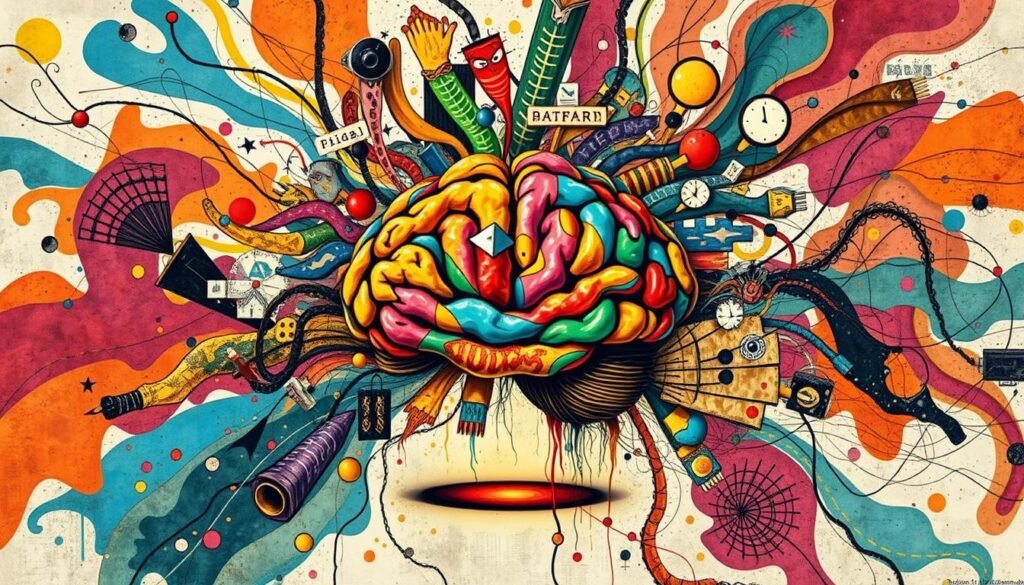Many of us wonder why our brains won’t calm down. An overactive mind can really stress us out. About 8% of adults have Generalized Anxiety Disorder (GAD), which makes it hard to relax. This can be due to low dopamine levels or an overly emotional brain.
Being exposed to too much negative media can also raise our stress levels by 20%. This makes it tough to unwind. We’ll look into how to calm our minds and figure out why they’re so restless. About 31.1% of U.S. adults will face an anxiety disorder at some point, so it’s key to know what makes our minds buzz.

Table of Contents
ToggleThe latest Relaxing Tips straight to your inbox!
Join 30,000+ subscribers for exclusive access to our Relaxing tips!
Key Takeaways
- Approximately 8% of adults experience Generalized Anxiety Disorder (GAD), which is linked to difficulty in relaxation.
- An overactive mind can be caused by various factors, including low dopamine levels and an overactive emotional brain.
- Exposure to constant negative media can increase stress levels by around 20%, contributing to an inability to relax.
- Ways to quiet the mind include reducing stress, increasing dopamine levels, and practicing relaxation techniques.
- Understanding the underlying causes of mental restlessness is essential to addressing the issue and finding effective solutions.
- Approximately 31.1% of U.S. adults will experience an anxiety disorder at some point in their lives, making it critical to prioritize mental health.
- Why won’t my brain calm down is a common question, and finding the right strategies can help individuals manage their overactive mind and improve their overall well-being.
Understanding Our Overactive Minds
Many of us deal with an overactive mind, filled with racing thoughts. It’s hard to calm them down. To grasp this, we need to look into the science behind it. Stress, mental health issues, and some substances can make our minds race.
By knowing these causes, we can find ways to calm our brains. Mindfulness is a great tool for this. It helps us stay in the present and quiet our minds. Practices like meditation, deep breathing, or yoga can help.
Physical activities like walking or jogging also help. They reduce stress and anxiety. This makes it easier to calm our minds.
Things like not enough sleep, too much caffeine, and some meds can make our minds hyperactive. Knowing these triggers helps us manage them. Mindfulness daily can also increase self-awareness and help us stop overthinking.
By using these strategies and being mindful, we can control our overthinking. This leads to a more peaceful mind. It positively affects our well-being, helping us live a balanced and fulfilling life.
| Technique | Benefits |
|---|---|
| Mindfulness meditation | Reduces stress and anxiety, improves focus |
| Deep breathing exercises | Calms the mind, reduces stress hormones |
| Physical activity | Reduces stress and anxiety, improves mood |
The Physical Impact of an Unsettled Mind
We often don’t realize how much our minds affect our bodies. Relaxation exercises for the mind can lessen these effects. An unsettled mind can make our heart beat faster, raise our body temperature, and cause other symptoms. This happens because our nervous system and brain are closely connected.
It’s key to calm our nervous system to lessen the physical effects of an unsettled mind. Racing thoughts can make it hard to relax. Deep breathing or meditation can calm our mind and reduce physical symptoms.
To handle the physical effects of an unsettled mind, we need to find the root causes. This might mean figuring out what triggers racing thoughts and learning how to deal with them. Combining relaxation exercises with a healthy lifestyle can help reduce these effects and boost our well-being.
Here are some ways to calm our nervous system:
- Regular exercise
- Healthy eating
- Adequate sleep
- Stress management techniques
By adding these strategies to our daily life, we can lessen the physical effects of an unsettled mind. This promotes a healthier, more balanced lifestyle.
Why Won't My Brain Calm Down? The Neuroscience Explained
When our mind won’t stop racing, it’s hard to relax. This feeling of restlessness comes from overthinking and feeling mentally tired. The brain’s stress system, neural paths, and chemicals play big roles in this.
The amygdala, part of the brain, controls our emotions and actions. Stress, fear, and anxiety can make it go into overdrive. This can lead to acting irrationally and feeling regretful. But, mindfulness can help manage these emotions and reduce such reactions.
Understanding Neurotransmitter Activity
Chemicals like serotonin and dopamine help us feel good. When they’re out of balance, we can feel tired and restless. Mindfulness and meditation can boost these chemicals, making us feel calmer.
The Brain's Stress Response System
The brain’s stress system is meant to keep us safe. But, too much stress can make us feel tired and restless. Knowing how this system works helps us manage stress. Techniques like deep breathing and muscle relaxation can lower stress hormones.
Neural Pathways and Thought Patterns
Our thoughts and brain paths can make us feel restless. By noticing our thoughts and feelings, we can start to change them. Meditation and therapy can help us develop more positive ways of thinking.
| Technique | Benefits |
|---|---|
| Mindfulness Meditation | Reduces stress and anxiety, improves mood |
| Cognitive-Behavioral Therapy | Helps change negative thought patterns, improves emotional regulation |
| Deep Breathing Exercises | Reduces stress hormones, promotes relaxation |
The Connection Between Anxiety and Mental Restlessness
Anxiety can make it hard to find peace of mind. It fills our minds with worries and fears, causing constant mental unrest. To calm our minds, we must tackle the anxiety first.
Effective relaxation techniques for anxiety include deep breathing, progressive muscle relaxation, and mindfulness meditation. These methods can lessen anxiety and help us relax. Also, regular exercise and a healthy lifestyle can help reduce anxiety and boost our mental health.

It’s key to spot the signs of anxiety and manage it. By using relaxation techniques daily and focusing on self-care, we can find
| Technique | Description |
|---|---|
| Deep Breathing | Slow, deliberate breathing to calm the mind |
| Progressive Muscle Relaxation | Systematic relaxation of muscle groups to release tension |
| Mindfulness Meditation | Focused attention on the present moment to reduce anxiety |
Breaking the Cycle of Overthinking
To stop overthinking, we need to know what triggers it. We should watch our thoughts and feelings closely. Mindfulness helps us stay in the moment and feel less anxious.
Mindfulness, like meditation and deep breathing, can ease anxiety. Adding these to our day helps us understand ourselves better. This leads to better ways to handle our thoughts and feelings.
Practical Interruption Techniques
There are ways to stop overthinking. Doing physical activities, using grounding techniques, and talking to others can help. These methods interrupt negative thoughts and help us think more positively.
Creating New Mental Habits
Changing our thinking patterns is key. Setting achievable goals, being kind to ourselves, and believing in our growth are important. These habits help us face challenges with confidence and resilience.
- Practice mindfulness exercises, such as meditation and deep breathing
- Engage in physical activities, such as walking or yoga
- Seek social support from friends, family, or a therapist
By using these strategies and adding mindfulness to our lives, we can overcome overthinking. This leads to clearer thinking and better mental health, which is vital for feeling better.
Immediate Techniques for Calming Your Mind
Dealing with racing thoughts can be tough. Finding ways to quiet your brain is key. Deep breathing exercises are a great start. They help lower anxiety and calm your mind.
Progressive muscle relaxation is another good method. It involves tensing and relaxing muscles to release tension. Pairing this with the “5,4,3,2,1” method can help you stay present.
There are more ways to calm your mind and reduce anxiety. For example:
- Engaging in physical activity, such as walking or yoga, to release endorphins and improve mood
- Practicing mindfulness and meditation to focus on the present moment
- Using aromatherapy, such as lavender or chamomile, to promote relaxation
- Listening to calming music or nature sounds to reduce stress
By using these techniques, you can quiet your brain and manage racing thoughts. It’s all about finding what works for you and making it a daily habit.

Join 30,000+ subscribers for exclusive access to our Relaxing tips!
The Power of Breathwork for Mental Peace
Exploring stress management, we find breathwork’s key role in mental peace. It involves techniques to lower stress and anxiety, helping us relax. Just a few minutes of practice can bring big benefits.
Simple breathing exercises are perfect for any time and place. Starting with five-second inhales and exhales, you can increase to ten as you get better. This, along with muscle relaxation, helps relax both body and mind.
Basic Breathing Exercises
Basic breathing exercises are simple and fit into our daily lives. Diaphragmatic breathing, for example, triggers the body’s relaxation response. It leads to changes that calm the mind. Adding visualization, like peaceful scenes, boosts relaxation.
Advanced Breathing Techniques
Advanced techniques, like the 12-Second Power Breath, mix breathing with loving kindness meditation. They offer a fast way to calm down. Use them in stressful moments, like traffic jams or long waits.
Adding breathwork to our stress management can greatly benefit our mental health. Whether it’s basic exercises or advanced methods, breathwork is a powerful tool for peace and stress relief.
Physical Exercise as a Mental Reset Button
Regular physical exercise is a great way to calm your nervous system and slow down racing thoughts. Adding physical activity to your daily routine can lower anxiety and boost your mental health. Studies show that exercise can cut anxiety by up to 40% and lift your mood by 20% when done outdoors.
Here are some exercises that can help calm your mind:
- Walking, which can increase dopamine levels and provide an outlet for excess energy
- Yoga, which can reduce anxiety and stress levels by 30%
- Swimming, which can lead to a decrease in anxiety symptoms by 20%
- Dancing, which can lower anxiety levels by 18% by increasing serotonin production and improving mood

By making exercise a daily habit, you can take a big step towards calming your mind and stopping racing thoughts. As we look at more ways to find mental calm, we’ll see how important mindfulness is next.
| Physical Exercise | Anxiety Reduction | Mood Improvement |
|---|---|---|
| Walking | Up to 40% | 20% |
| Yoga | 30% | 20% |
| Swimming | 20% | 15% |
| Dancing | 18% | 15% |
Mindfulness Practices for a Quieter Mind
Exploring ways to calm our minds, mindfulness for racing thoughts stands out as a strong method. By adding mindfulness to our daily life, we can stop overthinking and enjoy the present.
Meditation is a good starting point for mindfulness. We can start with short sessions, focusing on our breath or a mantra. As we get more comfortable, we can make our sessions longer. Mindful movement practices, like yoga or tai chi, also help us find calm and awareness.
Here are some daily habits to help us stay mindful:
- Practicing deep breathing exercises
- Engaging in mindful walking or eating
- Writing down our thoughts and feelings to process and release them
By adding these mindfulness practices to our daily routine, we can lower stress and anxiety. We can find peace and clarity. As we continue, we can try different techniques to find what works best for us.
Nutrition and Supplements for Brain Calm
We often overlook how nutrition and supplements help with brain calm and anxiety. Research shows that some foods and supplements can aid in relaxation and anxiety relief. Eating a balanced diet with omega-3 fatty acids, vitamin D, and magnesium can ease anxiety symptoms and promote calm.
Some key supplements for brain calm include:
- Omega-3 fatty acids: EPA and DHA reduce anxiety and depression symptoms
- Vitamin D: important for mood and brain function
- Magnesium: helps reduce stress and anxiety by promoting calm
- L-theanine: an amino acid in green tea that lowers stress and promotes calm
Always talk to a healthcare professional before adding supplements to your diet. They can guide you on the best supplements for your needs and ensure you get the nutrients your brain needs.

- Fatty fish: rich in omega-3 fatty acids
- Nuts and seeds: good sources of magnesium and healthy fats
- Leafy greens: rich in folate and other essential nutrients
Adding these foods and supplements to your diet can help with relaxation and anxiety relief. Always consult with a healthcare professional before making big changes to your diet or supplement routine.
| Supplement | Benefits |
|---|---|
| Omega-3 fatty acids | Reduces symptoms of anxiety and depression |
| Vitamin D | Essential for mood regulation and cognitive function |
| Magnesium | Helps reduce stress and anxiety by promoting relaxation |
| L-theanine | Helps reduce stress levels and promote relaxation |
Creating an Environment for Mental Peace
Our surroundings greatly affect our mental health. To foster mental peace, we must focus on physical space, digital management, and setting limits. These steps help us quiet our minds and manage racing thoughts.
A clean and organized space can lower stress and anxiety. Here are some tips:
- Clear out clutter in your living and work areas for calmness.
- Use storage to keep things hidden and keep your space neat.
- Add plants and natural elements for a peaceful feel.
Managing our digital world is also key for mental peace. This means setting tech limits, like turning off notifications and taking breaks from social media. Healthy coping strategies can greatly improve our mental state.
By using these strategies, we can make our environment supportive of our mental health. This allows us to handle stress and anxiety better.
| Strategy | Benefits |
|---|---|
| Physical space organization | Reduces stress and anxiety, promotes calmness |
| Digital environment management | Improves mental well-being, reduces distractions |
| Setting boundaries | Enhances self-care, promotes work-life balance |
Professional Help and When to Seek It
Getting professional help is key to managing mental health. About 19.1% of U.S. adults deal with an anxiety disorder each year. This shows how vital mental health tips and stress management strategies are every day.
Benefits of professional help include:
- Personalized guidance and support
- Access to evidence-based therapies and treatments
- Improved coping mechanisms and stress management techniques
It’s important to get help when symptoms stop you from doing daily things. Or when stress and anxiety feel too much. Using mental health tips and stress management strategies with professional advice can help manage mental health. This improves overall well-being.

Remember, asking for help is a sign of strength. It’s key to focus on our mental health and well-being. By starting to seek help, we can move towards a healthier, happier life.
| Mental Health Condition | Prevalence in the U.S. |
|---|---|
| Anxiety Disorder | 19.1% of adults in a given year |
| Depressive Episode | 7.6% of adults in a given year |
Natural Remedies and Holistic Approaches
We often seek natural remedies and holistic methods to relax and lower anxiety. Herbal solutions like lavender oil and chamomile tea calm the mind and body. Relaxation exercises for the mind also help in reducing stress and anxiety.
Some natural remedies that calm the nervous system include:
- Lavender oil: A 2017 study found it can reduce anxiety and depression symptoms.
- Chamomile tea: A 2016 study showed it may lessen Generalized Anxiety Disorder (GAD) symptoms.
- Ashwagandha: A 2019 study found it can lower stress and cortisol levels.
Aside from herbal solutions, meditation and yoga are also helpful. They promote relaxation and reduce anxiety. By adding these natural remedies and holistic methods to our daily lives, we can manage stress better and improve our overall well-being.
| Remedy | Benefits |
|---|---|
| Lavender oil | Reduces anxiety and depression symptoms, improves sleep |
| Chamomile tea | Reduces symptoms of Generalized Anxiety Disorder (GAD) |
| Ashwagandha | Reduces stress levels and cortisol levels |
Long-term Strategies for Maintaining Mental Balance
Maintaining mental balance is key for our well-being. To do this, we need to quiet the brain every day. Getting 7 to 8 hours of sleep each night is vital. It helps our brain work right and keeps us from feeling mentally tired.
Regular exercise is also important. We should do at least 2.5 hours of moderate exercise weekly. Activities like walking, jogging, or yoga can lower stress and boost our mood. Taking short breaks to stretch or breathe deeply can also help us focus better.
Dealing with racing thoughts is another big part of staying balanced. Mindfulness, like meditation, can calm our minds and lessen stress. Doing things we enjoy, like reading or listening to music, can also help us relax.
By making these habits part of our daily life, we can keep our minds balanced. Remember, our mental health is just as important as our physical health. By taking care of it, we can live happier and healthier lives.
The Role of Sleep in Mental Calmness
Sleep is key to keeping our minds calm. A good night’s rest can lower anxiety and help us relax. Studies show that activities like meditation and deep breathing can also boost sleep and ease anxiety.
Some great ways to ease anxiety include:
- Progressive muscle relaxation
- Mindfulness meditation
- Yoga
- Journaling
These methods help quiet our minds and bodies. They make it easier to fall and stay asleep. Also, sticking to a sleep schedule, avoiding caffeine and screens before bed, and creating a cozy sleep space can help too.
Understanding how sleep and calmness are linked is vital. Anxiety can really mess with our sleep. By using relaxation techniques and valuing sleep, we can handle anxiety better and feel mentally better overall.
By focusing on sleep and adding relaxation techniques to our day, we can feel calmer and less anxious. Remember, a good night’s sleep is just the start of a happier, healthier life.
| Relaxation Technique | Benefits |
|---|---|
| Meditation | Reduces stress and anxiety, improves sleep quality |
| Deep Breathing | Calms the mind and body, reduces symptoms of anxiety |
| Yoga | Improves sleep quality, reduces stress and anxiety |
Conclusion: Your Path to a Calmer Mind
An unsettled mind can harm our health and happiness. But, finding peace is possible. By using relaxation techniques, we can calm our minds and feel more focused.
Changing our minds takes time and effort. But, with regular practice, we can stop overthinking. Mindfulness, deep breathing, and lifestyle changes can help. Find what works for you and do it often.
It’s time to focus on your mental health. A calmer mind helps us deal with life’s ups and downs. It lets us reach our goals and enjoy life’s precious moments. Start your journey to a peaceful life today.
FAQ
What is mental restlessness and how can it affect daily life?
Mental restlessness is when your mind won’t calm down. It makes you think too much, have trouble relaxing, and feel anxious. This can make it hard to focus, be present, and enjoy simple things.
What are the common triggers of brain hyperactivity?
Stress, mental health issues, and some substances can make your mind race. Knowing what triggers this can help you manage it better.
How does an unsettled mind impact the body?
An overactive mind can cause physical problems like tension, headaches, and stomach issues. Learning to handle these physical signs is key to feeling better overall.
What is the neuroscience behind an unsettled mind?
Things like neurotransmitters, the brain’s stress response, and thought patterns can make your mind busy. Understanding this can help you find ways to calm down.
How is anxiety connected to mental restlessness?
Anxiety can make it hard to stop thinking and relax. It’s important to deal with anxiety to find mental peace.
What are some techniques for breaking the cycle of overthinking?
You can identify your thought patterns, interrupt them, and create new habits. These steps can help you stop overthinking and relax.
What are some immediate techniques for calming the mind?
Deep breathing, muscle relaxation, and visualization can calm your mind right away. They help you relax and feel more at ease.
How can breathwork help promote mental peace?
Adding breathing exercises to your routine can lower stress and anxiety. This leads to a calmer mind and better mental health.
How can physical exercise serve as a mental reset button?
Exercise can calm your nervous system and slow down racing thoughts. It acts as a mental reset, helping you relax.
What are some mindfulness practices for a quieter mind?
Meditation, mindful movement, and daily mindfulness can quiet your mind. They help you find mental peace and calm.
How can nutrition and supplements support a calmer mind?
Certain foods and supplements can improve brain function and help you relax. They’re good for managing mental restlessness.
How can creating the right environment help promote mental peace?
Organizing your space, managing digital distractions, and setting boundaries can create a calm environment. This supports a peaceful mind.
When should someone seek professional help for mental restlessness?
If mental restlessness is really affecting your life and you can’t handle it on your own, get help from a mental health expert. They can offer valuable guidance.
What are some natural remedies and holistic approaches for promoting relaxation?
Herbal remedies, alternative therapies, and lifestyle changes can help manage mental restlessness. They complement traditional methods for relaxation.
What are some long-term strategies for maintaining mental balance?
Building sustainable habits, like stress management and lifestyle changes, can keep your mind balanced. They help you stay calm over time.
How does sleep play a role in mental calmness?
Good sleep hygiene, relaxing routines, and managing night thoughts are key for quality sleep. This is essential for a calm and balanced mind.



Pingback: "Why Won't My Brain Let Me Relax?"A Complete Guide 2 Finding
Pingback: What Relaxes the Brain the Most? Latest Research and Effecti
Pingback: "How to sleep in 2 minutes like Nobita? The Ultimate Sleep H
Pingback: "Can we sleep in 2 minutes how?"
Pingback: How To Relax My Brain? How To Relax My Brain? Essential T...
Pingback: How Can I Relax My Brain Fast?
Pingback: How Do You Calm Your Mind From Overthinking Quotes?
Pingback: How To Know If Someone Is Pretending To Be Asleep?
Pingback: How To Know If Someone Is Pretending To Be Asleep? How To Kn